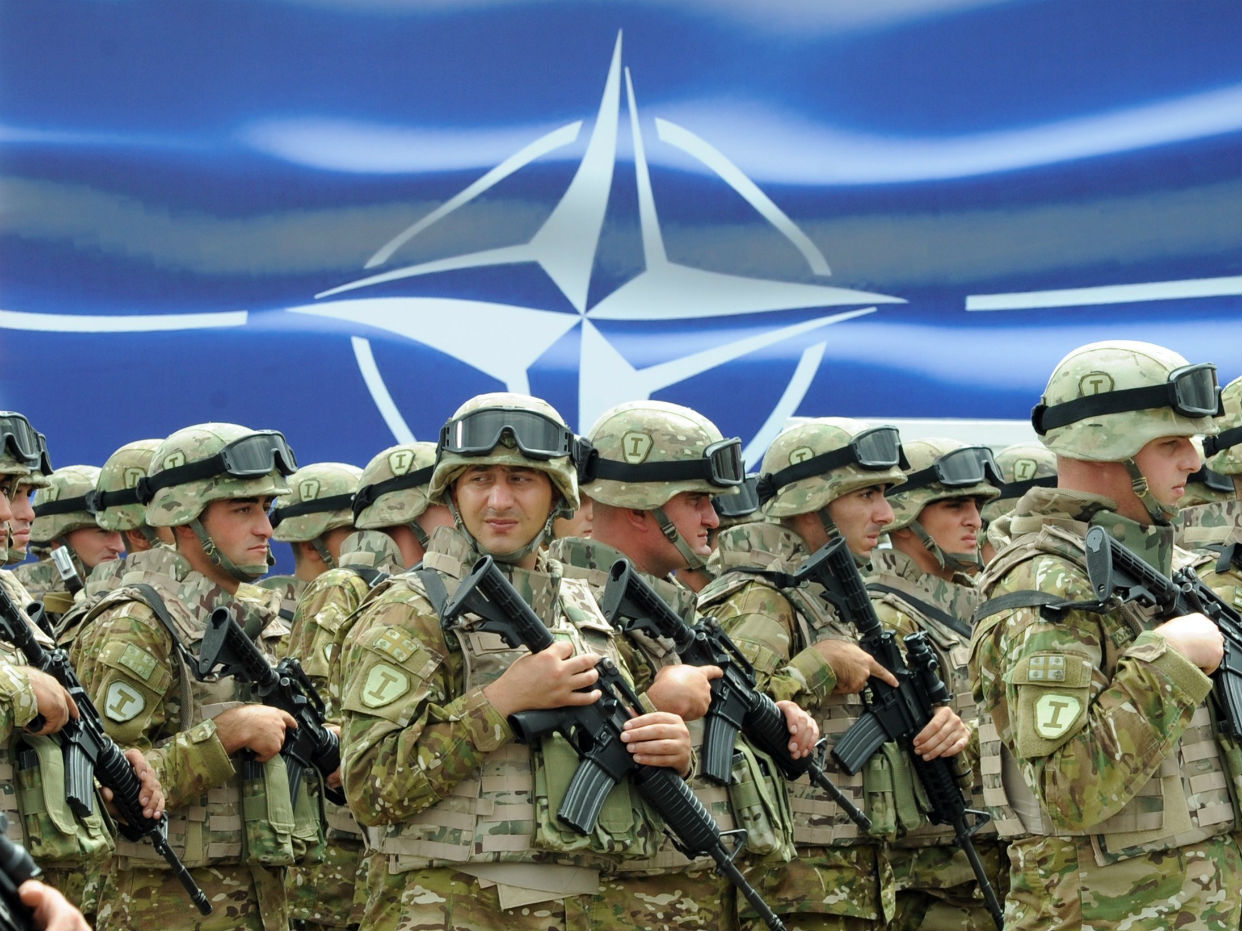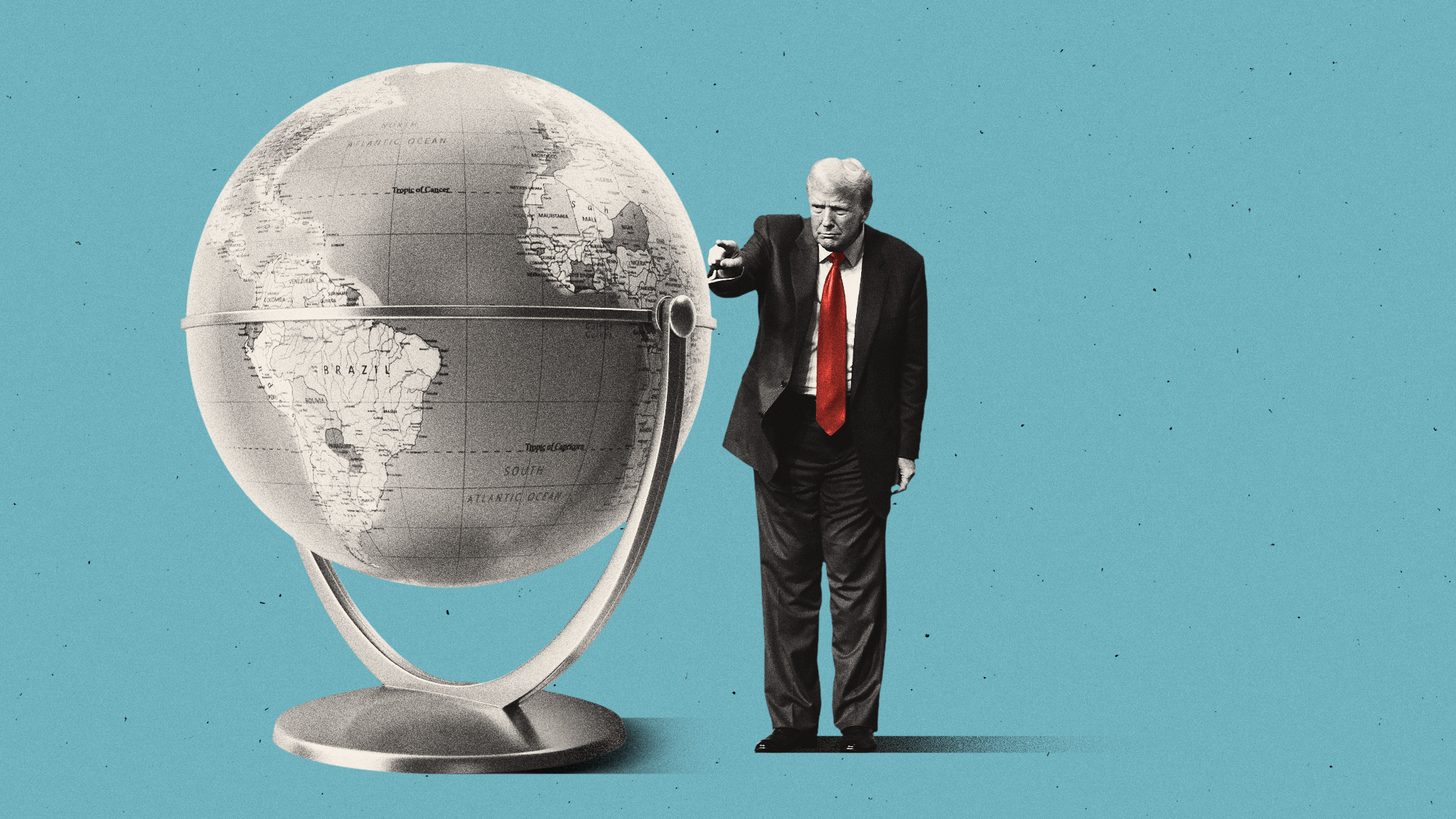Nato experiencing ‘brain death’ warns Macron
French president says Europe must ‘wake up’ or risk disappearing geopolitically

A free daily email with the biggest news stories of the day – and the best features from TheWeek.com
You are now subscribed
Your newsletter sign-up was successful
The French President Emmanuel Macron has issued a stark warning over the future of Nato, saying European countries can no longer rely on the US to defend its allies.
In a “blunt” interview with The Economist, Macron said Europe stands on “the edge of a precipice”, and needs to start thinking of itself strategically as a geopolitical power otherwise “we will no longer be in control of our destiny.”
“What we are currently experiencing is the brain death of Nato. You have no coordination whatsoever of strategic decision-making between the United States and its Nato allies” he said, singling out the “uncoordinated aggressive action by another Nato ally, Turkey, in an area where our interests are at stake”.
The Week
Escape your echo chamber. Get the facts behind the news, plus analysis from multiple perspectives.

Sign up for The Week's Free Newsletters
From our morning news briefing to a weekly Good News Newsletter, get the best of The Week delivered directly to your inbox.
From our morning news briefing to a weekly Good News Newsletter, get the best of The Week delivered directly to your inbox.
Accusing the Trump administration of turning its back on its long-standing partners in Europe, he also said he was unsure whether he still believed in the “collective defence” stipulations of article five of Nato’s founding treaty, under which an attack against one member is considered an attack against all members.
Trump has frequently accused European Nato members of failing to provide their fair share of military spending and for relying too heavily on the US for their defence. Last year, he threatened to “moderate” Washington's commitment to the alliance if members fail to meet a 2% of GDP defence spending target.
By contrast, his abrupt decision to pull most US forces out of north-eastern Syria in October angered many European Nato members and opened the way for Turkey, itself a powerful Nato member, to push into Syria and expel Kurdish fighters from a security zone along its border.
–––––––––––––––––––––––––––––––For a round-up of the most important stories from around the world - and a concise, refreshing and balanced take on the week’s news agenda - try The Week magazine. Get your first six issues for £6–––––––––––––––––––––––––––––––
A free daily email with the biggest news stories of the day – and the best features from TheWeek.com
“This about much more than one US president” says BBC defence correspondent Jonathan Marcus. “Nato must defend against multiple threats which different countries perceive in different ways. And a number of allies seem less and less keen to espouse the liberal democratic values that lie at Nato's core”.
The Guardian says Macron's comments amount to a “questioning of Nato’s effectiveness and suggestion European countries in the 29-member alliance should reassess their situation” ahead of a 70th anniversary summit with leaders including Donald Trump in the UK early next month.
Highlighting “the deep splits between Europe and the US over the transatlantic military alliance” the Financial Times reports his remarks “triggered angry private reactions from some European diplomats who saw them as damaging to Nato — if not necessarily untrue”.
In a sign of splits within Europe as well, DW says Macron's remarks are “a long way” from those made by German Defence Minister Annegret Kramp-Karrenbauer a day earlier, in which she described the alliance as a cornerstone of modern Europe.
“Nato is and will remain the anchor of European security,” Kramp-Karrenbauer said at a private event with Nato chief Jens Stoltenberg. “But it is also clear that Europe must increase its own complementary ability to act.”
Reuters reports France “has long pressed for closer European defense cooperation but has faced resistance from Britain and others which say the United States remains key to Western defense, especially in the face of a more assertive Russia”.
-
 What to know before filing your own taxes for the first time
What to know before filing your own taxes for the first timethe explainer Tackle this financial milestone with confidence
-
 The biggest box office flops of the 21st century
The biggest box office flops of the 21st centuryin depth Unnecessary remakes and turgid, expensive CGI-fests highlight this list of these most notorious box-office losers
-
 The 10 most infamous abductions in modern history
The 10 most infamous abductions in modern historyin depth The taking of Savannah Guthrie’s mother, Nancy, is the latest in a long string of high-profile kidnappings
-
 Munich Security Conference: a showdown between Europe and Trump?
Munich Security Conference: a showdown between Europe and Trump?Today’s Big Question Report suggests European leaders believe they can no longer rely on the US for military support – but decoupling is easier said than done
-
 What is ‘Arctic Sentry’ and will it deter Russia and China?
What is ‘Arctic Sentry’ and will it deter Russia and China?Today’s Big Question Nato considers joint operation and intelligence sharing in Arctic region, in face of Trump’s threats to seize Greenland for ‘protection’
-
 New START: the final US-Russia nuclear treaty about to expire
New START: the final US-Russia nuclear treaty about to expireThe Explainer The last agreement between Washington and Moscow expires within weeks
-
 What would a UK deployment to Ukraine look like?
What would a UK deployment to Ukraine look like?Today's Big Question Security agreement commits British and French forces in event of ceasefire
-
 Would Europe defend Greenland from US aggression?
Would Europe defend Greenland from US aggression?Today’s Big Question ‘Mildness’ of EU pushback against Trump provocation ‘illustrates the bind Europe finds itself in’
-
 Greenland, Colombia, Cuba: where is Donald Trump eyeing up next?
Greenland, Colombia, Cuba: where is Donald Trump eyeing up next?Today's Big Question Ousting Venezuela’s leader could embolden the US administration to exert its dominance elsewhere
-
 Did Trump just end the US-Europe alliance?
Did Trump just end the US-Europe alliance?Today's Big Question New US national security policy drops ‘grenade’ on Europe and should serve as ‘the mother of all wake-up calls’
-
 Is conscription the answer to Europe’s security woes?
Is conscription the answer to Europe’s security woes?Today's Big Question How best to boost troop numbers to deal with Russian threat is ‘prompting fierce and soul-searching debates’